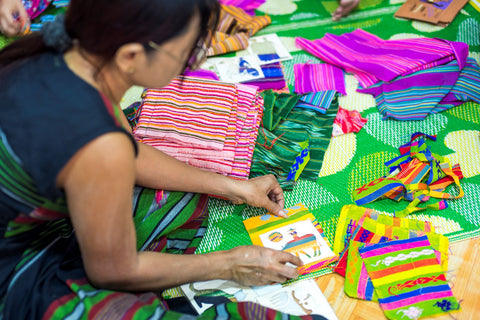ABOUT US
Our story so far - crafting a better life...
Our story began over a decade ago. Having worked in the area of disability for a few years in Myanmar, we experienced many times how the lack of paid work opportunities and social assistance for people with disabilities resulted in their being a burden to their families - families who were already struggling to survive.
We decided to set up a social enterprise that would aim at enabling people with disabilities to have a sustainable livelihood through producing and selling handicrafts.

Because Myanmar has such a rich variety of cultures, textiles, art forms and imagery, this seemed the perfect place from which to grow livelihoods which are not only sustainable sources of dignified work, but which also bring joy by celebrating the beautiful side of Myanmar.
Although there were plenty of examples of similar initiatives in other countries, we knew from the start that setting up in Myanmar, with its poorly-developed infrastructure and restrictive economic policies, would be extra-challenging.
Despite this we founded Pann Nann Ein in 2013. Our vision is: enabling people with disabilities in Myanmar to develop their creative potential so they can have safe, dignified work.

Our journals and cards remain our most popular products
Our confidence for starting this work, and sustaining motivation as we continue, is the belief that all people have been created in the image of the Creator God. Therefore, everyone is an individual of equal value, with innate creative gifting.
Prayer is also vital in our work: the same God who gives creative potential also sustains us each day.
What does Pann Nann Ein mean?
Our vision and ethos is reflected in our name, which translates into English as "Creative Royal Home". And it describes the way we believe people with disabilities, through realising their God-given creative potential, are not only included in society but find a real place of belonging.

Early days
We initially started working with our artisans in the house of a group member in a poorer township called Dala, over the river from downtown Yangon. But after a couple of years we were able to rent our own place to open a workshop.
With our own space we began to widen our range of products, and train our group members in new skills. And with our own place to meet we were able to provide more social, educational and health care.
Our workshop also provided a place for community and friendship to grow amongst group members who had often lived very segregated lives, some only interacting with their immediate family.

Although quite a number of our group members were deaf, only one or two knew any sign language, so in order for everyone to be included and belong in their own right, we all learnt sign language together!
Within our group, members have a variety of disabilities: some from birth, such as cerebral palsy and spina bifida and others through accident or illness. Several have intellectual disability. Amongst the 25 members, we try to keep a balance between those who are able to work relatively self-sufficiently, and those who need more intensive support.

Making Christmas wreaths and recycled paper for our calendar
More recently
In the decade before the Covid-19 pandemic, Myanmar had experienced significant economic growth, and was increasingly open to foreign investment and tourism.
This resulted in a growing market for the sales of our products within Myanmar. The PNE brand had become well-known and, as an organisation, we were becoming self-sufficient as a social enterprise. Alongside this, some of our group members were also becoming the main income-earner in their household.

And then, like the rest of the world, Covid 19 stopped everything.
Myanmar imposed strict controls on travel and work, meaning that international visitors, apart from a handful of diplomatic envoys, were banned for a period of nearly 2 years. The domestic control measures also had a devastating impact on the local economy and, like many places, poorer households often suffered the most.
For Pann Nann Ein, this resulted not only in the sudden loss of our market, but also restricted our ability to work with our group members.
Unlike some countries, there were no government welfare payments to cushion the blow. But during this time, through the help of generous donors supporting through our Shareholder Scheme, PNE was able to provide modest welfare support to sustain group members. And at the same time we were able to invest in different ways to make and send products to sell in other countries.

The name 'Pann Nann Ein ' means 'Creative Royal Home.'
However, mid-way through the pandemic, Myanmar suffered a further blow, with a military coup in early 2021 throwing the country into political turmoil.
Already reeling from the pandemic-related losses, the coup further isolated Myanmar from the rest of the world, and deepened the economic woes. Insecurity, inflation and inequalities all increased, pushing more people into poverty.
And so whilst much of the world has been able to progress on the post-pandemic recovery, Myanmar has taken a huge leap back economically with no immediate hope of recovery.
Against these headwinds, we are thankful - and at times amazed - that PNE has been able to continue. We are very thankful during the last 3 years for those who have supported us through our Shareholder Scheme, as well as hosting pop-up shops in various countries.

After the pandemic...
For PNE, the 'new normal' is constantly changing: whether finding new places to sell our products, developing new production techniques or new product lines to cope with shortages of raw materials or electricity. For some group members, this has also meant a different livelihood other than producing crafts, something more suitable to their immediate location.
However, the impetus to reinvent and re-imagine ourselves and our products has also had unexpected rewards.
A lovely example is the calendar we produced for 2023. We had existing designs which we didn't want to waste, but we weren't able to make the recycled paper any more. Options for using any other suitably attractive imported card were nil... so, we prayed.
After praying we hit on the idea of trying to print on a discarded Braille paper textbook we had lying around the office. We had to smooth down the 'bumps' a fair bit otherwise the ink smudged. But we soon realised that this would be very attractive and, along with a Braille paper covered stand, we had a new product upcycling Braille!
The local school for the blind was getting rid of large numbers of outdated textbooks - so we had a ready supply of raw materials to upcycle. This provided much needed work for a few of our artisans. So far, we've made about 140 in total!

Screen printing the calendar months and crafting the stand together
What's new?
Our 'new normal' involves learning to adapt to continued uncertainty - but that doesn't mean we don't have plans!
An important new venture has been the launch of our online shop in the UK - which you are looking at now! By making it easier for people to buy our products, we also hope this will provide more stability for PNE's artisans.
Another strand of our recent work involves seeking ways to engage more people with disabilities as artisans in different parts of the country - some of which are affected by conflict, and so even more challenging. This will take much thought, planning and prayer - but we believe it's vital we should be taking steps towards this.
Our co-founder, Hnin Phyu Kaung, often speaks of the wider vision of Pann Nann Ein:
“It is not just to teach technical craft-making skills. We want to enable our artisans to grow in confidence and independence, through business and life-skills training. That way they can become active members of their families and communities. And instead of being dependents, they can become providers for their families.”
– MA HNIN PHYU KAUNG, CO-FOUNDER OF PANN NANN EIN
At Pann Nann Ein, we want to see that vision extended to more people with disabilities - not because we want to expand, but because there are so many more who need this opportunity.
And if you'd like to support us in this next stage of our journey, we'd be delighted if you'd consider becoming a Shareholder - our Scheme to raise 'investment' specifically to enable us to invest in others.
For more information please see Become a shareholder

